Klaus Theweleit | |
|---|---|
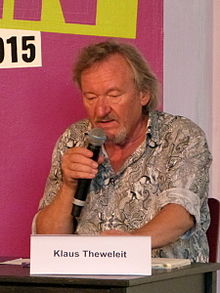 Theweleit | |
| Born | 7 February 1942 |
| Nationality | German |
| Occupation(s) | Sociologist and writer |
| Website | http://www.klaus-theweleit.de/ |
Klaus Theweleit (born 7 February 1942) is a German sociologist and writer.
Klaus Theweleit | |
|---|---|
 Theweleit | |
| Born | 7 February 1942 |
| Nationality | German |
| Occupation(s) | Sociologist and writer |
| Website | http://www.klaus-theweleit.de/ |
Klaus Theweleit (born 7 February 1942) is a German sociologist and writer.
Theweleit was born in Ebenrode, East Prussia (now Nesterov, Russia), the son of a railway company worker and a Jewish mother. He wrote the following about his father: "Above all he was a railroader, wholeheartedly, as he used to say, and then a human being. He was a rather good human being and a good fascist. His beatings which he gave away abundantly and brutally as it was usual in his time and with the best of intentions were the first lessons I received on fascism, a fact I only later fully discovered." [1]
Theweleit studied German studies and English studies in Kiel and Freiburg. From 1969–1972, he worked as a freelancer for a public radio station (Südwestfunk).
He wrote his dissertation Freikorpsliteratur und der Körper des soldatischen Mannes about Freikorps narratives, a sub-literature produced by paramilitaries organized in Freikorps, who, during the early Weimar republic, had fought external or internal enemies. In academia only few historians had read and analysed this literature before Theweleit. His book Männerphantasien (1977); translated as Male Fantasies (1987), a study of the "proto-fascist consciousness" in general and the bodily experience of these former soldiers in particular. [2] Throughout the book Theweleit uses ideas, terminology and empirical experience from works of Margaret Mahler, Wilhelm Reich, Gilles Deleuze, Félix Guattari, Melanie Klein, and Michel Foucault among others to develop his theory of the "fascist male imprinting and socialization". In the introduction, Theweleit points out that discussions with Margaret Berger and his wife Monika Theweleit-Kubale (both of whom have professional clinical experience) had an important influence on the book as well as the feedback from Erhard Lucas, a leading German left-wing historian of the Weimar Unrest. [3]
Theweleit lives in Freiburg, he teaches in Germany, the United States, Switzerland, and Austria. He was a lecturer at the Institute of Sociology at the University of Freiburg and lecturer at the film academy in Berlin. From 1998 until retirement he was a professor for "art and theory" at the Staatliche Akademie für Bildende Künste, the art college, at Karlsruhe.
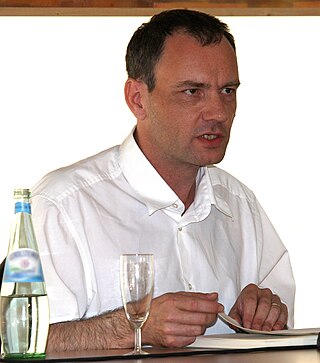
Helmut Krausser is a German author, poet, playwright, composer and professional chess player who was born in Esslingen.

Monika Mann was a German American author and feature writer. She was born in Munich, Germany, the fourth of six children of the Nobel Prize–winning author Thomas Mann and Katia, née Katharina Pringsheim.
Ulrich Becher was a German author and playwright.
Uwe Topper is a German amateur researcher and author of books about historic, ethnographic, and anthropological subjects.

Otto Eberhard Rössler is a German biochemist known for his work on chaos theory and the theoretical equation known as the Rössler attractor. He is best known to the general public for his involvement in a failed lawsuit to halt the Large Hadron Collider due to fears that it would generate mini black holes.
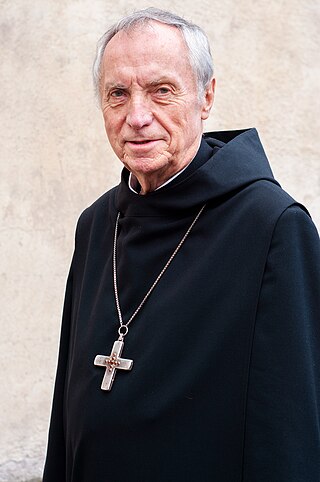
Notker Wolf was a German Benedictine monk, priest, abbot, musician, and author. He was a member of St. Ottilien Archabbey located in Bavaria, Germany, which is part of the Benedictine Congregation of Saint Ottilien. He served as the ninth Abbot Primate of the Benedictine Confederation of the Order of Saint Benedict from 2000 to 2016. He was known as the "rock abbot", for playing flute and sometimes e-guitar with the rock band Feedback in concerts and recordings.

Peter Rühmkorf was a German writer who significantly influenced German post-war literature.
Alfred Polgar was an Austrian-born columnist, theater critic, writer and occasionally translator.
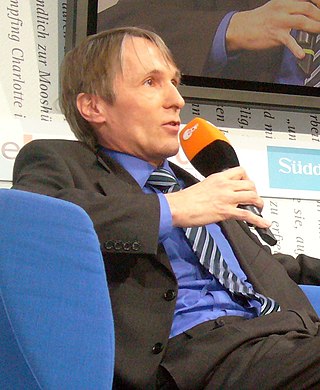
Hubertus Knabe is a German historian and was the scientific director of the Berlin-Hohenschönhausen Memorial, a museum and memorial in a notorious former Stasi torture prison in Berlin. Knabe is noted for several works on oppression in the former Communist states of Eastern Europe, particularly in East Germany. He became involved with green politics, and was active in the Alliance '90/The Greens.

Wolf Haas is an Austrian writer. He is most widely known for his crime fiction novels featuring detective Simon Brenner, four of which were made into films. He has won several prizes for his works, including the German prize for crime fiction.
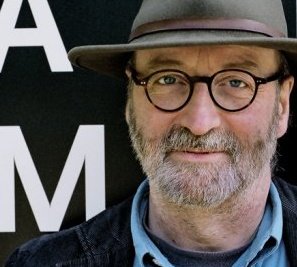
Hans-Michael Bock is a German film historian, filmmaker, translator and writer.
Kriminalgeschichte des Christentums is the main work of the author and church critic Karlheinz Deschner. It describes the misconduct attributed to various Christian churches, denominations, sects, and leagues, as well as its representatives and Christian sovereigns during Christian history. The work covers the entire history of Christianity from its biblical beginnings until the present. It was published in ten volumes beginning in 1986, with the final volume appearing in March 2013.

Freimut Duve was a German journalist, writer, politician and human rights activist. From 1980 to 1998 he was a member of the Bundestag for the Social Democratic Party of Germany (SPD). He was the first OSCE Representative on Freedom of the Media from 1998 to 2003. He was lesser known on the German literary scene.
Hans Jantzen was a German art historian who specialized in Medieval art.

Gerhard Rühm is an Austrian author, composer and visual artist.

Matthias Nawrat is a German writer.
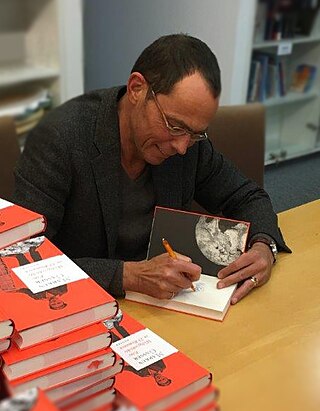
Markus Gasser is an Austrian literary scholar and author.
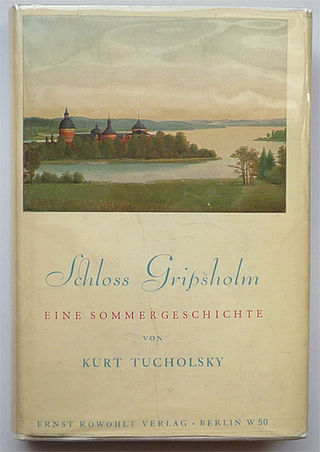
Schloss Gripsholm: Eine Sommergeschichte is the title of a story (Erzählung) by Kurt Tucholsky, published in 1931. It is a love story with comic and melancholic elements, reminiscent of the author's first novel, Rheinsberg: Ein Bilderbuch für Verliebte.

Peter Kurzeck was a German writer.
Henning Albrecht is a German historian.